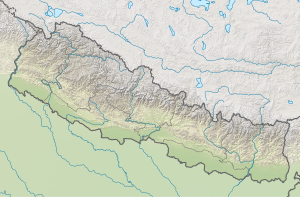Baiteshwor Rural Municipality
Baiteshwor
वै,तेश्वर गाउँपालिका | |
|---|---|
| Coordinates: 27°38′N 86°09′E / 27.64°N 86.15°E | |
| Country | |
| Province | Bagmati |
| District | Dolakha |
| Wards | 8 |
| Established | 10 March 2017 |
| Government | |
| • Type | Rural Council |
| • Chairperson | Mr. Chhabi Lama |
| • Vice-chairperson | Mr. Ravindra Acharya |
| Area | |
• Total | 80.41 km2 (31.05 sq mi) |
| Population (2011) | |
• Total | 19,876 |
| • Density | 250/km2 (640/sq mi) |
| Time zone | UTC+5:45 (Nepal Standard Time) |
| Headquarter | Pandu, Namdu |
| Website | baiteshwormun |
Baiteshwor is a rural municipality located within the Dolakha District of the Bagmati Province of Nepal. The municipality spans 80.41 square kilometres (31.05 sq mi) of area, with a total population of 19,876 according to a 2011 Nepal census.[1][2]
On March 10, 2017, the Government of Nepal restructured the local level bodies into 753 new local level structures.[3][4] The previous Gairimudi, Mirge, Kabhre, Namdu and Chhetrapa VDCs were merged to form Baiteshwor. Baiteshwor is divided into 8 wards, with Kabhre declared the administrative center of the rural municipality.
Demographics
[edit]At the time of the 2011 Nepal census, Baiteshwor Rural Municipality had a population of 19,876. Of these, 71.3% spoke Nepali, 20.8% Tamang, 3.7% Newar, 2.1% Jirel, 1.4% Sherpa, 0.1% Magar, 0.1% Maithili, 0.1% Rai and 0.2% other languages as their first la|nguage.[5]
In terms of ethnicity/caste, 30.1% were Chhetri, 21.1% Tamang, 17.2% Hill Brahmin, 9.2% Newar, 5.2% Sarki, 4.1% Damai/Dholi, 3.8% Kami, 2.6% Sanyasi/Dasnami, 2.3% Jirel, 1.4% Gharti/Bhujel, 1.4% Sherpa, 0.6% Thami, 0.4% Magar, 0.1% Badi, 0.1% Rai and 0.4% others.[6]
In terms of religion, 73.9% were Hindu, 22.2% Buddhist, 2.2% Prakriti, 1.5% Christian and 0.2% others.[7]
In terms of literacy, 63.0% could read and write, 3.5% could only read and 33.5% could neither read nor write.[8]
References
[edit]- ^ "District Corrected Last for RAJAPATRA" (PDF). www.mofald.gov.np. Retrieved 17 July 2018.
- ^ "स्थानीय तहहरुको विवरण" [Details of the local level bodies]. www.mofald.gov.np/en (in Nepali). Ministry of Federal Affairs and Local Development. Retrieved 17 July 2018.
- ^ "New local level structure comes into effect from today". www.thehimalayantimes.com. The Himalayan Times. 10 March 2017. Retrieved 17 July 2018.
- ^ "New local level units come into existence". www.kathmandupost.ekantipur.com. 11 March 2017. Retrieved 18 July 2018.
- ^ NepalMap Language [1]
- ^ NepalMap Caste [2]
- ^ NepalMap Religion [3]
- ^ NepalMap Literacy [4]
External links
[edit]



